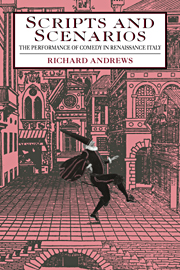Book contents
- Frontmatter
- Contents
- Preface
- Introduction: Italy in the sixteenth century
- 1 Precedents
- 2 The first ‘regular’ comedies
- 3 The second quarter-century, outside Venice
- 4 The second quarter-century, Venice and Padua
- 5 Improvised comedy
- 6 Obstacles to comedy
- 7 Scripts and scenarios
- Notes
- Chronological bibliography of comedies, 1500–1560
- General bibliography
- Index
5 - Improvised comedy
Published online by Cambridge University Press: 29 October 2009
- Frontmatter
- Contents
- Preface
- Introduction: Italy in the sixteenth century
- 1 Precedents
- 2 The first ‘regular’ comedies
- 3 The second quarter-century, outside Venice
- 4 The second quarter-century, Venice and Padua
- 5 Improvised comedy
- 6 Obstacles to comedy
- 7 Scripts and scenarios
- Notes
- Chronological bibliography of comedies, 1500–1560
- General bibliography
- Index
Summary
DEFINITIONS AND EVIDENCE
In 1567, the Duchy of Mantua was visited by two competing theatre companies, both including women: one was actually directed by an actress whose stage name was ‘Flaminia’, and the other run jointly by a ‘Pantalone’ (possibly Giulio Pasquati) and the actress Vincenza Armani. The artistic and commercial rivalry between the groups was made more interesting for the public by the fact that each leading lady was being courted by a different aristocratic patron – it is reported that the whole city was divided between fans of ‘Flaminia’ and supporters of Vincenza. As well as mounting improvised comic scenarios, each woman also starred in a more serious play, one based on the Virgilian story of Dido and the other taken from Ariosto's Orlando furioso. By the 1560s, then, professional companies were an established fact of life in northern and central Italy. The first surviving notarial document regarding the constitution of such a group dates from 1545.
It is not intended here to give a comprehensive presentation of commedia dell'arte – that is a task which has already been performed by various reliable scholars, and readers who wish to acquire a full picture of the elements of the genre should turn to them. In this chapter we shall be pursuing only those aspects on which there may be something new to say, and which arise out of what has been presented so far: namely the links, in so far as they can be determined, between dramaturgical practice in scripted and in unscripted comedies.
Information
- Type
- Chapter
- Information
- Scripts and ScenariosThe Performance of Comedy in Renaissance Italy, pp. 169 - 203Publisher: Cambridge University PressPrint publication year: 1993
